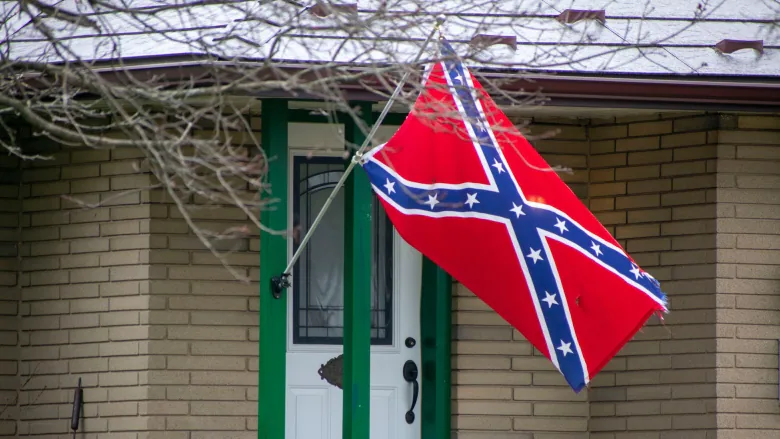April 27, 2022
-CBC
Whenever Amie Archibald-Varley sees a Confederate flag waving in the wind at a rural Hamilton home in her neighbourhood, she said she feels fear and confusion.
“I have small children … they’re racialized as well … it’s concerning because it’s like ‘Are my kids going to face this type of hate? Are my kids going to be called the n-word or have to experience this type of fear?'” Archibald-Varley, who is Jamaican Canadian, told CBC Hamilton.
Archibald-Varley said she and her family live minutes away from the home.
The Confederate battle flag was flown during the U.S. Civil War, notoriously by Gen. Robert E. Lee’s army that fought to preserve slavery, and became synonymous with the secessionist states.
The symbol was later resurrected during the civil rights movement by those opposed to equal rights for Black people, and has since been associated with white supremacist groups.
Last summer, Hamilton city councillors voted to ban the flag and the Nazi swastika from city property, classifying them as hate symbols. Police acknowledged then that it was not a criminal offence to fly a Confederate flag on one’s own property. It would only be considered a crime if an investigation revealed that placement of the flag was motivated by hate.
Archibald-Varley says she originally tweeted about the flag in February but shared another tweet on Sunday which drew attention from the Canadian-Anti Hate Network (CAHN), the Hamilton Area Anti-Racism Coalition (HAARC) and Hamilton Centre For Civic Inclusion (HCCI).
“Why would anybody think it’s acceptable?” she asked.
The city has grappled with a reputation for hate. Statistics Canada data show it had the country’s highest per-capita rate of hate crimes in 2019, 2018, 2016 and 2014.
Resident says they don’t care about concerns
CBC Hamilton visited the home in Binbrook, south east of central Hamilton, on Tuesday afternoon. The flag could be seen out front.
The person who answered the door, who didn’t want to be named, said they “don’t care what other people think” and said they don’t think the flag was racist.
They also said they’ve been flying the flag for over two years, haven’t had any prior complaints and said other locals fly the flag.
“I fly that for freedom, that is my choice. I live in a free country,” said the resident.
“I’m an individual and I have a right … it’s not offensive, it’s all how you choose to look at it … if I could afford the General Lee, I’d park it in the driveway.”
CAHN, HAARC and HCCI said the flag doesn’t represent freedom and isn’t ambiguous — it’s clearly racist.
“It celebrates the slavery and murder of a Black person,” said CAHN deputy director Elizabeth Simons.
“The fact it’s couched in sort of a free speech argument isn’t surprising to us … it’s unfortunate the homeowner feels that way.”
HAARC executive director Lyndon George said the situation is a stark reminder there’s more work to be done to fight racism.
“There clearly is a disconnect to the lived experiences of those who are deeply impacted by these flags and symbols,” he said.
“It is sickening to see it in a place in which you live.”
Police say they can’t take it down
Hamilton police spokesperson Jackie Penman said the service saw the post on social media which prompted a visit to the home.
The resident told CBC Hamilton police came by Monday evening. Penman said police met with the homeowner to make them aware of the community impact.
“Unfortunately, there is currently no legislation that would provide police with the grounds to lay charges or compel the homeowner to take down the flag,” Penman said.
“The threshold would be the intent to commit a criminal offence such as Wilful Promotion of Hatred or Public Incitement of Hatred for example.”
Simons said the CAHN argues the flag breaks the law but police services are being too relaxed in their interpretation of the law.
George and HCCI executive director Kojo Damptey said this situation shows the laws around hate symbols aren’t tough enough.
“One, we should amend the criminal code. Two, there should be provincial laws that legislate the standard definition of what a hate crime is, and on the municipal level, municipalities should make sure in their bylaws no hate symbols should be displayed on city property and private property,” Damptey said.
‘Politicians need to take action’
Archibald-Varley said despite tagging Mayor Fred Eisenberger and MPP Donna Skelly in her tweets about the flag, she hasn’t heard back from any politicians.
CBC Hamilton contacted Skelly and the mayor for comment.
The city’s social media account responded to one of Archibald-Varley’s tweets asking her to report the incident to police. She said the response was inadequate.
Archibald-Varley said elected officials should denounce the flag being flown at the home.
“Maybe if we don’t have leaders that are willing to talk about this hate, we should have other people who are willing to do that.” she said.
“There’s a lot of racialized people here and we’re feeling alone. We’re feeling not heard and I think it’s time people stand up against this.”




